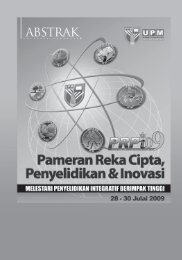BUKU ABSTRAK - Universiti Putra Malaysia
BUKU ABSTRAK - Universiti Putra Malaysia
BUKU ABSTRAK - Universiti Putra Malaysia
You also want an ePaper? Increase the reach of your titles
YUMPU automatically turns print PDFs into web optimized ePapers that Google loves.
Agriculture<br />
Economic Benefits of Sustainable Agriculture<br />
Prof. Dr. Mad Nasir Shamsudin<br />
Hairuddin Mohd. Amir and Alias Radam<br />
Faculty of Agriculture, University <strong>Putra</strong> <strong>Malaysia</strong>,<br />
43400 UPM Serdang, Selangor, <strong>Malaysia</strong>.<br />
+603-8946 4170; nasir@agri.upm.edu.my<br />
Environmental protection is a basic element of sustainable agricultural development. Agricultural production<br />
practices, however, can cause negative externalities. One main concern of the externality is the negative effects<br />
of pesticide use. This has motivated the application of Integrated Pest Management (IPM) program. This study<br />
attempts to evaluate the economic benefits of IPM to address the widespread misuse of pesticides in cabbage<br />
production. IPM application in cabbage production includes initiatives on the optimal use of pesticides,<br />
complementary weed control strategies, and alternative cultural and biological controls. Results of this study<br />
showed that the programme would generate economic benefits which include improvements in water quality,<br />
food safety, pesticide application safety, and long term sustainability of pest management systems.Thus there is<br />
justification for public investment of resources in training and educational programs to increase awareness about<br />
IPM and promote IPM adoption.<br />
Keywords: Integrated pest management, economic benefits, cabbage production<br />
New Nano-emulsion System in Weeds Control Formulations<br />
Prof. Dr. Mahiran Basri<br />
Lim Chaw Jiang, Dzolkifli Omar, Abu Bakar Salleh and Mohd. Basyaruddin Abdul Rahman and Raja Noor<br />
Zaliha Raja Abdul Rahman<br />
Faculty of Science, University <strong>Putra</strong> <strong>Malaysia</strong>,<br />
43400 UPM Serdang, Selangor, <strong>Malaysia</strong>.<br />
+603-8946 7266; mahiran@science.upm.edu.my<br />
The global pesticides production is amounted to 1.5 - 2.5 million tons of active ingredients (AIs) annually.<br />
However, less than 0.1% conventionally applied pesticides reaches the target sites, with the pesticides being lost<br />
via spray drift, off-target deposition, run-off and photodegradation. To minimize the pesticides dissipation, one<br />
of the most important ways is to increase the penetration of AIs into plant foliage. A new nano-emulsion system<br />
containing oil phase, surfactants and water, offers large surface area for absorption with the droplet size extremely<br />
small (20-200nm), and uniformly distributed, thus provides enhanced and rapid penetration. Glyphosate<br />
isopropylamine (IPA), a water-soluble herbicide active, the penetration through hydrophobic epicuticular wax<br />
and cuticle are the main barriers. Oil phase in nano-emulsion could make glyphosate increases its bioavailability<br />
to penetrate and translocate well into the waxy layers of leaves. Water in the nano-emulsion system provides<br />
hydration and solubilisation medium to the hydrophilic glyphosate in the foliar uptake. The nano-emulsion system<br />
uses less surfactant than commercial herbicide (Roundup®), reduces the great impact to the environment. The use<br />
of renewable resources of nonionic surfactant, alkylpolyglucosides (APG), and vegetable oils of fatty acid methyl<br />
esters (FAMEs), in the nano-emulsion system to replace the toxic surfactant polyoxyethyleneamine (POEA) in<br />
Roundup®, renders good biodegradability, environmentally friendly and economic viability to foster sustainable<br />
agriculture. The surface tensions of the nano-emulsion systems are extremely low at 24.0 - 27.0 mN/m. The nanoemulsion<br />
formulations showed very good control on weeds Asystasia gangetica, Diodia ocimifolia, Eleusine<br />
indica and Paspalum conjugatum.<br />
Keywords: Nano-emulsio esters, pesticides, sustainable agriculture<br />
20



